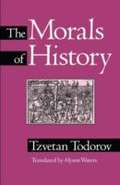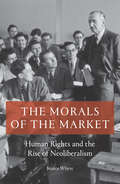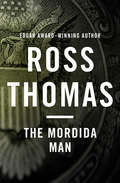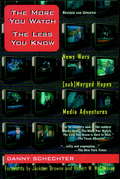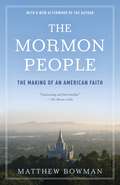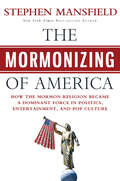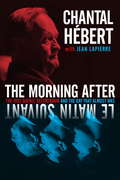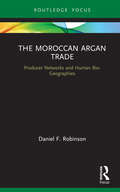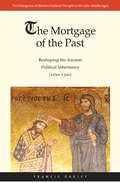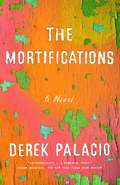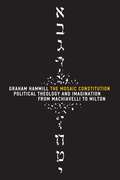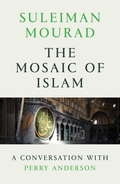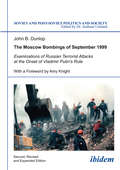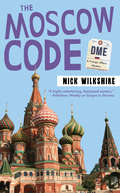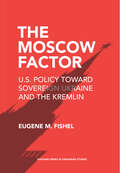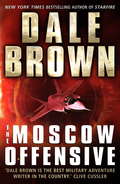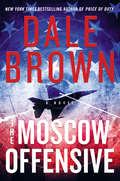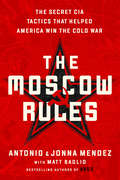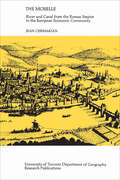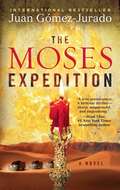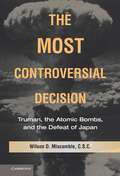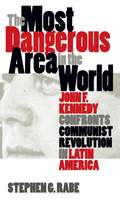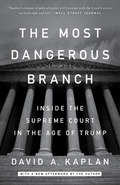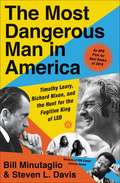- Table View
- List View
The Morals of History (Translation of: Les morales de l'histoire)
by Tzvetan Todorov Alyson WatersThe celebrated theorist Tzvetan Todorov offers here a thought provoking study of the complex relationship between 'ethics' and 'history'. In exploring such issues as how one practices and assesses equality among different societies, Todorov confronts topics ranging from the conquest of America and nineteenth-century colonialism, to democracy and conflicts of the Self versus the Other.
The Morals of the Market: Human Rights and the Rise of Neoliberalism
by Jessica WhyteThe fatal embrace of human rights and neoliberalismWhy did the rise of human rights in the 1970s coincide with the institutionalisation of neoliberalism? And why has the neoliberal age also been the age of human rights? Drawing on detailed archival research on the parallel histories of human rights and neoliberalism, Jessica Whyte uncovers the place of human rights in neoliberal attempts to develop a moral framework for a market society.In the wake of World War Two, neoliberals saw demands for new rights to social welfare and self-determination as threats to &‘civilisation&’. Yet, rather than rejecting rights, they developed a distinctive account of human rights as tools to depoliticise civil society, protect private investments and shape liberal subjects. Honing in on neoliberal political thought, Whyte shows that the neoliberals developed a stark dichotomy between politics, conceived as conflictual, coercive and violent, and civil society, which they depicted as a realm of mutually-beneficial, voluntary, market relations between individual subjects of rights. In mobilising human rights to provide a moral language for a market society, neoliberals contributed far more than is often realised to today&’s politics of human rights.
The Mordida Man (Mysterious Press-highbridge Audio Classics Ser.)
by Ross ThomasOnly one man can save the president&’s kidnapped brother in this propulsive thriller from the author &“without peer in American suspense&” (Los Angeles Times). American agents abduct a high-profile terrorist in broad daylight on the streets of London, subduing him with a tranquilizer. He dies a few hours later on a flight back to Washington, DC, and the body is dropped into the ocean. Hours later, the President&’s brother—a political powerhouse in his own right—boards a plane to Las Vegas that doesn&’t land in Nevada. Libyan radicals are at the controls, and he is their prisoner. The only man who can save him is Chubb Dunjee. A former United Nations operative with skills in every aspect of political negotiation, Chubb became famous for solving problems with well-placed bribes. Saving the President&’s brother should be no trouble for him. But the Libyans don&’t want a bribe. They want blood.
The More You Watch the Less You Know
by Robert Mcchesney Danny Schechter Jackson BrowneA candid insider's tale of how the media really works and why it doesn't work the way it should, The More You Watch, The Less You Know has emerged as a key catalyst in the debate on media reform. The More You Watch, The Less You Know recounts Schechter's media adventures, from when he was "Danny Schechter the News Dissector" on Boston's WBCN radio, to his stints as a producer at ABC's 20/20 and CNN, to his personal odyssey chronicling the anti-Apartheid revolution in South Africa, to his development of innovative programming like South Africa Now and Rights & Wrongs as an independent producer. In this age of telecommunications bills and media mergers, The More You Watch, The Less You Know is an insider's passionate plea for freedom of the (electronic) press.
The Mormon People: The Making of an American Faith
by Matthew Bowman"From one of the brightest of the new generation of Mormon-studies scholars comes a crisp, engaging account of the religion's history."--The Wall Street Journal With Mormonism on the nation's radar as never before, religious historian Matthew Bowman has written an essential book that pulls back the curtain on more than 180 years of Mormon history and doctrine. He recounts the church's origins and explains how the Mormon vision has evolved--and with it the esteem in which Mormons have been held in the eyes of their countrymen. Admired on the one hand as hardworking paragons of family values, Mormons have also been derided as oddballs and persecuted as polygamists, heretics, and zealots. The place of Mormonism in public life continues to generate heated debate, yet the faith has never been more popular. One of the fastest-growing religions in the world, it retains an uneasy sense of its relationship with the main line of American culture. Mormons will surely play an even greater role in American civic life in the years ahead. The Mormon People comes as a vital addition to the corpus of American religious history--a frank and balanced demystification of a faith that remains a mystery for many.With a new afterword by the author. "Fascinating and fair-minded . . . a sweeping soup-to-nuts primer on Mormonism."--The Boston Globe "A cogent, judicious, and important account of a faith that has been an important element in American history but remained surprisingly misunderstood."--Michael Beschloss "A thorough, stimulating rendering of the Mormon past and present."--Kirkus Reviews "[A] smart, lucid history."--Tom Brokawis a church with a powerful sense of its own identity and an uneasy sense of its relationship with the main line of American culture. Mormons will surely play an even greater role in American civic life in the years ahead. In such a time, The Mormon People comes as a vital addition to the corpus of American religious history--a frank and fair-minded demystification of a faith that remains a mystery for many.
The Mormonizing of America: How the Mormon Religion Became a Dominant Force in Politics, Entertainment, and Pop Culture
by Stephen MansfieldStephen Mansfield, the acclaimed New York Times best-selling author, has highlighted the growing popularity of Mormonism-a belief system with cultic roots-and the implications of its critical rise. Mormons are moving into the spotlight in pop culture, politics, sports, and entertainment via presidential candidates like Romney and Huntsman, media personality Glenn Beck, mega-bestselling Twilight author Stephanie Meyer, and The Book of Mormon, the hottest show on Broadway. Mormonism was once a renegade cult at war with the U.S. Army in the 1800s, but it has now emerged as not only the fastest-growing religion, but as a high-impact mainstream cultural influence.
The Morning After: The 1995 Quebec Referendum and the Day that Almost Was
by Chantal HebertA sly, insightful and wonderfully original book from one of Canada's most popular political analysts, Chantal Hébert, and one of Quebec's top political broadcasters, Jean Lapierre. Only the most fearless of political journalists would dare to open the old wounds of the 1995 Quebec referendum, a still-murky episode in Canadian history that continues to defy our understanding. The referendum brought one of the world's most successful democracies to the brink of the unknown, and yet Quebecers' attitudes toward sovereignty continue to baffle the country's political class. Interviewing 17 key political leaders from the duelling referendum camps, Hébert and Lapierre begin with a simple premise: asking what were these political leaders' plans if the vote had gone the other way. Even 2 decades later, their answers may shock you. And in asking an unexpected question, these veteran political observers cleverly expose the fractures, tensions and fears that continue to shape Canada today.
The Moroccan Argan Trade: Producer Networks and Human Bio-Geographies (Earthscan Studies in Natural Resource Management)
by Daniel F. RobinsonThis book provides one of the most detailed and comprehensive examinations of the Moroccan argan tree, the products derived from it and its cultural significance. The Moroccan argan trade is booming, but as the tree provides important ecological functions and plays an important role, both financially and culturally, for the Amazigh (Berber) people it has become a key topic of debate. This book thoroughly examines the production stories, benefits and impacts and provides a value-chain analysis which compares different cooperatives and approaches to production. It assesses the fair-trade approaches and attempts at sustainable production of the bio-trade resource. While being a vital source of income, the argan tree has a significant cultural importance to the Indigenous people and the book assesses the impact of the argan trade on their well-being, community and livelihoods. It examines Indigenous knowledge and intellectual property issues relating to the trade, as well as Berber-state law and politics. Assessing factors relating to legal and economic geography international trade, socio-cultural and human-nature relationships, the book provides a comprehensive analysis of the argan tree which will appeal to students, scholars and practitioners.
The Mortgage of the Past
by Francis OakleyFrancis Oakley continues his magisterial three-part history of the emergence of Western political thought during the Middle Ages with this second volume in the series. Here, Oakley explores kingship from the tenth century to the beginning of the fourteenth, showing how, under the stresses of religious and cultural development, kingship became an inceasingly secular institution. “A masterpiece and the central part of a trilogy that will be a true masterwork. ”—Jeffrey Burton Russell, University of California, Santa Barbara
The Mortifications: A Novel
by Derek Palacio<P>Derek Palacio's stunning, mythic novel marks the arrival of a fresh voice and a new chapter in the history of 21st century Cuban-American literature. <P>In 1980, a rural Cuban family is torn apart during the Mariel Boatlift. Uxbal Encarnación--father, husband, political insurgent--refuses to leave behind the revolutionary ideals and lush tomato farms of his sun-soaked homeland. His wife Soledad takes young Isabel and Ulises hostage and flees with them to America, leaving behind Uxbal for the promise of a better life. <P>But instead of settling with fellow Cuban immigrants in Miami's familiar heat, Soledad pushes further north into the stark, wintry landscape of Hartford, Connecticut. There, in the long shadow of their estranged patriarch, now just a distant memory, the exiled mother and her children begin a process of growth and transformation. <P>Each struggles and flourishes in their own way: Isabel, spiritually hungry and desperate for higher purpose, finds herself tethered to death and the dying in uncanny ways. Ulises is bookish and awkwardly tall, like his father, whose memory haunts and shapes the boy's thoughts and desires. Presiding over them both is Soledad. <P>Once consumed by her love for her husband, she begins a tempestuous new relationship with a Dutch tobacco farmer. But just as the Encarnacións begin to cultivate their strange new way of life, Cuba calls them back. Uxbal is alive, and waiting. <P>Breathtaking, soulful, and profound, The Mortifications is an intoxicating family saga and a timely, urgent expression of longing for one's true homeland.
The Mosaic Constitution: Political Theology and Imagination from Machiavelli to Milton
by Graham HammillIt is a common belief that scripture has no place in modern, secular politics. Graham Hammill challenges this notion in The Mosaic Constitution, arguing that Moses's constitution of Israel, which created people bound by the rule of law, was central to early modern writings about government and state. Hammill shows how political writers from Machiavelli to Spinoza drew on Mosaic narrative to imagine constitutional forms of government. At the same time, literary writers like Christopher Marlowe, Michael Drayton, and John Milton turned to Hebrew scripture to probe such fundamental divisions as those between populace and multitude, citizenship and race, and obedience and individual choice. As these writers used biblical narrative to fuse politics with the creative resources of language, Mosaic narrative also gave them a means for exploring divine authority as a product of literary imagination. The first book to place Hebrew scripture at the cutting edge of seventeenth-century literary and political innovation, The Mosaic Constitution offers a fresh perspective on political theology and the relations between literary representation and the founding of political communities.
The Mosaic Constitution: Political Theology and Imagination from Machiavelli to Milton
by Graham HammillIt is a common belief that scripture has no place in modern, secular politics. Graham Hammill challenges this notion in The Mosaic Constitution, arguing that Moses’s constitution of Israel, which created people bound by the rule of law, was central to early modern writings about government and state.Hammill shows how political writers from Machiavelli to Spinoza drew on Mosaic narrative to imagine constitutional forms of government. At the same time, literary writers like Christopher Marlowe, Michael Drayton, and John Milton turned to Hebrew scripture to probe such fundamental divisions as those between populace and multitude, citizenship and race, and obedience and individual choice. As these writers used biblical narrative to fuse politics with the creative resources of language, Mosaic narrative also gave them a means for exploring divine authority as a product of literary imagination. The first book to place Hebrew scripture at the cutting edge of seventeenth-century literary and political innovation, The Mosaic Constitution offers a fresh perspective on political theology and the relations between literary representation and the founding of political communities.
The Mosaic of Islam: A Conversation with Perry Anderson
by Perry Anderson Suleiman MouradA comprehensive introduction to the faith and politics of IslamToday, 23 percent of the global population is Muslim, but ignorance and misinformation about Islam persist. In this fascinating and useful book, Perry Anderson interviews the noted scholar of Islam Suleiman Mourad about the Qurʾan and the history of the faith.Mourad elucidates the different stages in Islam's development: the Qurʾan as scripture and the history of its codification; Muhammad and the significance of his Sunna and Hadith; the Sunni-Shiʿi split and the formation of various sects; the development of jihad; the transition to modernity and the challenges of reform; and the complexities of Islam in the modern world. He also looks at Wahhabism from its inception in the eighteenth century to its present-day position as the movement that galvanized modern Salafism and gave rise to militant Islam or jihadism.The Mosaic of Islam reveals both the richness and the fissures of the faith. It speaks of the different voices claiming to represent the religion and spans peaceful groups and manifestations as well as the bloody confrontations that disfigure the Middle East, such as the Saudi intervention in the Yemen and the collapse of Syria and Iraq.From the Trade Paperback edition.
The Moscow Bombings of September 1999: Examinations of Russian Terrorist Attacks at the Onset of Vladimir Putin's Rule (Soviet and Post-Soviet Politics and Society #110)
by John B. DunlopThe five chapters of this volume focus on the complex and tumultuous events occurring in Russia during the five months from May through September 1999. They sparked the Russian invasion of Chechnya on 1 October and vaulted a previously unknown former KGB agent into the post of Russian prime minister and, ultimately, president.The five chapters are devoted to: The intense political struggle taking place in Russia between May and August of 1999, culminating in an incursion by armed Islamic separatists into the Republic of Dagestan. Two Moscow terrorist bombings of 9 and 13 September 1999, claiming the lives of 224 Muscovites and preparing the psychological and political ground for a full-blown invasion of Chechnya. The so-called Ryazan Incident of 22 September 1999, when eyewitnesses observed officers of the FSB special forces placing a live bomb in the basement of an apartment building in the town of Rzayan. The detonation of a powerful truck bomb outside of an apartment house in Buinaksk, Dagestan, on 4 September 1999, which took the lives of fifty-eight innocent victims. The explosion on 16 September 1999 of a truck bomb in the city of Volgdonsk in southern Russia, which killed eighteen persons and seriously wounded eighty-nine
The Moscow Code: A Foreign Affairs Mystery
by Nick WilkshireIn Moscow, the truth can be a dangerous commodity. Ottawa bureaucrat–turned-diplomat Charlie Hillier is back. Having barely survived his first posting in Havana, Charlie is eager to put what he learned there to good use. And it isn’t long before he's thrust into a fresh case — a technical writer from Toronto in a Moscow jail on dubious drug charges. Charlie has barely put a dent in the brick wall that is the Russian legal system when the jailed man turns up dead, the official explanation: suicide. And just when evidence to the contrary is discovered, the body is “accidentally” cremated by the authorities. Undeterred by bureaucratic stonewalling and determined to help the victim’s sister get to the bottom of her brother’s death, Charlie follows the sparse clues available. But what he uncovers brings them both far too close to powers more dangerous than they could have imagined. Suddenly, getting at the truth is less important than getting out of Russia in one piece.
The Moscow Factor: U.S. Policy toward Sovereign Ukraine and the Kremlin (Harvard Series in Ukrainian Studies #82)
by Eugene M. FishelIn 2014, Russia illegally annexed Crimea, bolstered a separatist conflict in the Donbas region, and attacked Ukraine with its regular army and special forces. In each instance of Russian aggression, the U.S. response has often been criticized as inadequate, insufficient, or hesitant.The Moscow Factor: U.S. Policy toward Sovereign Ukraine and the Kremlin is a unique study that examines four key Ukraine-related policy decisions across two Republican and two Democratic U.S. administrations. Eugene M. Fishel asks whether, how, and under what circumstances Washington has considered Ukraine’s status as a sovereign nation in its decision-making regarding relations with Moscow.This study situates the stance of the United States toward Ukraine in the broader context of international relations. It fills an important lacuna in existing scholarship and policy discourse by focusing on the complex trilateral—rather than simply bilateral—dynamics between the United States, Ukraine, and Russia from 1991 to 2016. This book brings together for the first time documentary evidence and declassified materials dealing with policy deliberation, retrospective articles authored by former policymakers, and formal memoirs by erstwhile senior officials. The study is also supplemented by open-ended interviews with former and returning officials.
The Moscow Offensive
by Dale BrownAmerica's first line of defense - Brad McLanahan and the heroes of the Iron Wolf Squadron - must counter a dangerous Russian strike from within the homeland in this cutting-edge tale from the New York Times master of the high-tech military thriller, Dale Brown.On a remote island estate, a billionaire investor sells his air freight company to a mysterious new owner. The purchaser is none other than the President of Russia, Gennadiy Gryzlov. The Russians will use these private planes to secretly transport dangerous cargo into the United States.The inept American President Stacy Anne Barbeau has failed to account for the Russian threat. But others have been vigilant and will not leave America defenseless. Brad McLanahan and the Iron Wolf Squadron have joined forces with the newly formed Alliance of Free Nations in Eastern Europe, to prepare for the attack they know is imminent. Working with the most cutting-edge technology, the team will deploy CIDs-Cybernetic Infantry Devices-twelve-foot-tall humanoid combat robots, each armed with more firepower than a conventional platoon.But their state-of-the-art weapons may not be enough to combat the threat. The Russians have managed to reverse engineer their own combat robots nearly decimated in a previous attack, and have slowly begun smuggling them across America's borders. Dealing with an unprecedented danger and a feckless president and congress, McLanahan and the Iron Wolf Squadron will once again put their own lives on the line to check this new Russian peril and keep the home of the brave and the free world safe.
The Moscow Offensive: A Novel (Patrick Mclanahan Ser. #22)
by Dale BrownAmerica’s first line of defense—Brad McLanahan and the heroes of the Iron Wolf Squadron—must counter a dangerous Russian strike from within the homeland in this cutting-edge tale from the New York Times master of the high-tech military thriller, Dale Brown.On a remote island estate, a billionaire investor sells his air freight company to a mysterious new owner. The purchaser is none other than the President of Russia, Gennadiy Gryzlov. The Russians will use these private planes to secretly transport dangerous cargo into the United States.The inept American President Stacy Anne Barbeau has failed to account for the Russian threat. But others have been vigilant and will not leave America defenseless. Brad McLanahan and the Iron Wolf Squadron have joined forces with the newly formed Alliance of Free Nations in Eastern Europe, to prepare for the attack they know is imminent. Working with the most cutting-edge technology, the team will deploy CIDs—Cybernetic Infantry Devices—twelve-foot-tall humanoid combat robots, each armed with more firepower than a conventional platoon.But their state-of-the-art weapons may not be enough to combat the threat. The Russians have managed to reverse engineer their own combat robots nearly decimated in a previous attack, and have slowly begun smuggling them across America’s borders. Dealing with an unprecedented danger and a feckless president and congress, McLanahan and the Iron Wolf Squadron will once again put their own lives on the line to check this new Russian peril and keep the home of the brave and the free world safe.
The Moscow Rules: The Secret CIA Tactics That Helped America Win the Cold War
by Jonna Mendez Antonio J. MendezFrom the spymaster and inspiration for the movie Argo: how a group of brilliant but under-supported CIA operatives developed breakthrough spy tactics that helped turn the tide of the Cold WarAntonio Mendez and his future wife Jonna were CIA operatives working to spy on Moscow in the late 1970s, at one of the most dangerous moments in the Cold War. Soviets kept files on all foreigners, studied their patterns, and tapped their phones. Intelligence work was effectively impossible. The Soviet threat loomed larger than ever.The Moscow Rules tells the story of the intelligence breakthroughs that turned the odds in America's favor. As experts in disguise, Antonio and Jonna were instrumental in developing a series of tactics--Hollywood-inspired identity swaps, ingenious evasion techniques, and an armory of James Bond-style gadgets--that allowed CIA officers to outmaneuver the KGB.As Russia again rises in opposition to America, this remarkable story is a tribute to those who risked everything for their country, and to the ingenuity that allowed them to succeed.
The Moselle: River and Canal from the Roman Empire to the European Economic Community
by Jean CermakianThe Moselle has been one of the main arteries of European Communication and transportation for centuries. The Romans used it as a main thoroughfare from southern to northern Europe and also began the improvements to its navigation that have continued intermittently through the industrial revolution to the present day. Professor Cermakian focuses on the historical, political, and geographical factors in the use and canalization of this international river – a focus that is derived from his interest in the details of standardizing transport networks and policy as an important part of 'European integration,' which he sees both as a long historical movement and as a present endeavour under EEC. The book offers a history of the political economy of an important river, a symbol for many of the spirit of Europe.(University of Toronto Department of Geography Research Publications 14)
The Moses Expedition: A Novel
by J.G. Jurado“Juan Gómez-Jurado has created a true masterpiece. The Moses Expedition is a brilliant thriller—sharp, suspenseful, and engrossing” (Brad Thor, author of Code of Conduct).After fifty years in hiding, the Nazi war criminal known as the Butcher of Spiegelgrund has finally been tracked down by Father Anthony Fowler, a CIA operative and a member of the Vatican’s secret service. He wants something from the Butcher—a candle covered in filigree gold that was stolen from a Jewish family many years before. But it isn’t the gold Fowler is after. As Fowler holds a flame to the wax, the missing fragment of an ancient map that uncovers the location of the Ten Commandments given to Moses is revealed. Soon Fowler is involved in an expedition to Jordan set up by a reclusive billionaire. But there is a traitor in the group who has ties to terrorist organizations back in the United States, and who is patiently awaiting the moment to strike. From wartime Vienna to terrorist cells in New York and a lost valley in Jordan, The Moses Expedition is a thrilling read about a quest for power and the secrets of an ancient world.
The Most Controversial Decision: Truman, the Atomic Bombs, and the Defeat of Japan
by Wilson D. MiscambleThis book explores the American use of atomic bombs and the role these weapons played in the defeat of the Japanese Empire in World War II. It focuses on President Harry S. Truman's decision-making regarding this most controversial of all his decisions. The book relies on notable archival research and the best and most recent scholarship on the subject to fashion an incisive overview that is fair and forceful in its judgments. This study addresses a subject that has been much debated among historians and it confronts head-on the highly disputed claim that the Truman administration practised 'atomic diplomacy'. The book goes beyond its central historical analysis to ask whether it was morally right for the United States to use these terrible weapons against Hiroshima and Nagasaki. It also provides a balanced evaluation of the relationship between atomic weapons and the origins of the Cold War.
The Most Dangerous Area in the World
by Stephen G. RabeIn March 1961, President John F. Kennedy announced the formation of the Alliance for Progress, a program dedicated to creating prosperous, socially just, democratic societies throughout Latin America. Over the next few years, the United States spent nearly $20 billion in pursuit of the Alliance's goals, but Latin American economies barely grew, Latin American societies remained inequitable, and sixteen extraconstitutional changes of government rocked the region. In this close, critical analysis, Stephen Rabe explains why Kennedy's grand plan for Latin America proved such a signal policy failure.Drawing on recently declassified materials, Rabe investigates the nature of Kennedy's intense anti-Communist crusade and explores the convictions that drove him to fight the Cold War throughout the Caribbean and Latin America--a region he repeatedly referred to as "the most dangerous area in the world." As Rabe acknowledges, Kennedy remains popular in the United States and Latin America, in part for the noble purposes behind the Alliance for Progress. But an unwavering determination to wage Cold War led Kennedy to compromise, even mutilate, those grand goals.
The Most Dangerous Branch: Inside the Supreme Court's Assault on the Constitution
by David A. KaplanIn the bestselling tradition of The Nine and The Brethren, The Most Dangerous Branch takes us inside the secret world of the Supreme Court. David A. Kaplan, the former legal affairs editor of Newsweek, shows how the justices subvert the role of the other branches of government—and how we’ve come to accept it at our peril. With the retirement of Justice Anthony Kennedy, the Court has never before been more central in American life. It is the nine justices who too often now decide the controversial issues of our time—from abortion and same-sex marriage, to gun control, campaign finance and voting rights. The Court is so crucial that many voters in 2016 made their choice based on whom they thought their presidential candidate would name to the Court. Donald Trump picked Neil Gorsuch—the key decision of his new administration. The next justice—replacing Anthony Kennedy—will be even more important, holding the swing vote over so much social policy. Is that really how democracy is supposed to work? Based on exclusive interviews with the justices and dozens of their law clerks, Kaplan provides fresh details about life behind the scenes at the Court – Clarence Thomas’s simmering rage, Antonin Scalia’s death, Ruth Bader Ginsburg’s celebrity, Breyer Bingo, the petty feuding between Gorsuch and the chief justice, and what John Roberts thinks of his critics. Kaplan presents a sweeping narrative of the justices’ aggrandizement of power over the decades – from Roe v. Wade to Bush v. Gore to Citizens United, to rulings during the 2017-18 term. But the arrogance of the Court isn’t partisan: Conservative and liberal justices alike are guilty of overreach. Challenging conventional wisdom about the Court’s transcendent power, The Most Dangerous Branch is sure to rile both sides of the political aisle.
The Most Dangerous Man in America: Timothy Leary, Richard Nixon and the Hunt for the Fugitive King of LSD
by Bill Minutaglio Steven L. DavisFrom Bill Minutaglio and Steven L. Davis, authors of the PEN Center USA award-winning Dallas 1963, comes a madcap narrative about Timothy Leary's daring prison escape and run from the law.On the moonlit evening of September 12, 1970, an ex-Harvard professor with a genius I.Q. studies a twelve-foot high fence topped with barbed wire. A few months earlier, Dr. Timothy Leary, the High Priest of LSD, had been running a gleeful campaign for California governor against Ronald Reagan. Now, Leary is six months into a ten-year prison sentence for the crime of possessing two marijuana cigarettes.Aided by the radical Weather Underground, Leary's escape from prison is the counterculture's union of "dope and dynamite," aimed at sparking a revolution and overthrowing the government. Inside the Oval Office, President Richard Nixon drinks his way through sleepless nights as he expands the war in Vietnam and plots to unleash the United States government against his ever-expanding list of domestic enemies. Antiwar demonstrators are massing by the tens of thousands; homemade bombs are exploding everywhere; Black Panther leaders are threatening to burn down the White House; and all the while Nixon obsesses over tracking down Timothy Leary, whom he has branded "the most dangerous man in America."Based on freshly uncovered primary sources and new firsthand interviews, THE MOST DANGEROUS MAN IN AMERICA is an American thriller that takes readers along for the gonzo ride of a lifetime. Spanning twenty-eight months, President Nixon's careening, global manhunt for Dr. Timothy Leary winds its way among homegrown radicals, European aristocrats, a Black Panther outpost in Algeria, an international arms dealer, hash-smuggling hippies from the Brotherhood of Eternal Love, and secret agents on four continents, culminating in one of the trippiest journeys through the American counterculture.
